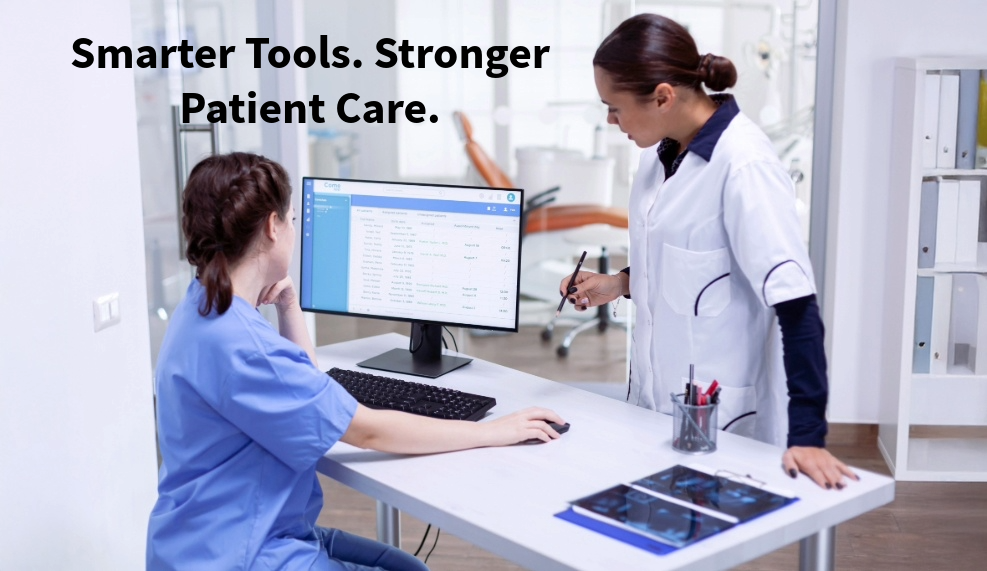Editor’s Note: This blog is part of our monthly series on adapting your dental practice for the AI-driven future. This series is written by the team at My Social Practice.
Your front desk team is drowning. Between answering phones, scheduling appointments, handling insurance questions, and managing walk-ins, they're stretched thinner than dental floss. Meanwhile, patients are calling after hours, leaving voicemails that pile up, and getting frustrated when they can't get immediate answers to simple questions.
Sound familiar? You're not alone. Most dental practices are dealing with the same front office bottleneck, and it's costing them both money and patient satisfaction.
But here's what’s changing: AI tools designed specifically for dental practices are stepping in to handle the routine stuff, so your team can focus on what actually matters, taking care of the patients sitting in your chairs.
This isn't about robots taking over your practice. It's about smart tools that work alongside your team to make everyone's job easier.
The Old Way vs. The New Way: Why Traditional Chatbots Failed
You've probably seen those little chat boxes in the bottom corner of websites. They pop up with a cheerful "Hi there! How can I help you today?" and then proceed to frustrate everyone who tries to use them.
Here's what typically happened with old chatbots:
Patient types: "I think I broke my tooth last night and it really hurts"
Old chatbot responds: "I see you mentioned 'tooth.' Please select from these options:
- General information about teeth
- Schedule a cleaning
- Contact us"
Patient: "No, I said it's BROKEN and hurts!"
Old chatbot: "I don't understand. Please select from these options..."
Traditional chatbots work like those annoying phone trees as they only recognize specific keywords and force patients into predetermined paths. If your question doesn't fit their script, you're stuck.
How AI Agents Actually Work
Modern AI systems for dental practices are completely different. They're called AI agents, not chatbots, because they can actually think through problems and have real conversations.
Here's the same scenario with an AI agent:
Patient types: "I think I broke my tooth last night and it really hurts"
AI agent responds: "I'm sorry to hear about your tooth pain. That sounds uncomfortable and potentially urgent. Can you tell me if the pain is constant or only when you bite down? I want to make sure we get you the right type of appointment."
Patient: "It hurts all the time now, especially when I drink anything cold"
AI agent: "That definitely sounds like something Dr. Smith should see today. I can check for emergency appointments this afternoon or tomorrow morning. Which works better for you?"
The AI agent understood the urgency, asked relevant follow-up questions, and immediately moved toward solving the problem. No scripts, no keyword matching, no frustration.
What Makes AI Agents Different
AI agents use advanced technology to understand context and intent, not just keywords. They can:
- Handle misspellings and casual language ("Can I book an appt?")
- Understand modern texting abbreviations
- Ask clarifying questions when needed
- Remember what was discussed earlier in the conversation
- Connect directly to your scheduling system to book real appointments
When a patient visits your website at 11:00 p.m. and types, "I think I cracked my tooth on some ice. It doesn't hurt much but feels sharp. Should I come in right away?" an AI agent built for dental practices recognizes this as a potentially urgent situation, asks follow-up questions to assess severity, and can immediately check your schedule for the appropriate type of appointment.
The patient gets help when they need it, and you capture an appointment that might have gone to a competitor the next day.
Why Chat Systems Work for Dental Practices
Your patients live on their phones. When they have a dental question or need to schedule an appointment, they want answers immediately, not during your business hours. Chat systems give them that instant response.
Today's younger patients communicate differently than previous generations. More than half of the world's population is now made up of Millennials and Gen Z who grew up with instant messaging as their primary form of communication. They've been texting and using messaging apps since childhood, so they naturally prefer typing quick messages over making phone calls. Many younger patients don't even check voicemail anymore; they expect immediate responses through digital channels.
These patients don't want to wait until your office opens to schedule appointments. They want AI chat or online booking so they can handle dental needs when it's convenient for them, like when the kids have finally been put to bed or during their lunch break at work.
This creates a real problem for dental practices. Research shows that most patients want the option to chat with dental offices online, but the vast majority of practices don't offer this service. If your practice only offers phone calls and voicemail, you're missing opportunities to connect with patients who prefer digital communication.
The Spanish-Speaking Patient Advantage
Here's something many practices don't consider: AI systems can communicate perfectly in Spanish (and other languages) without needing bilingual staff members.
For practices in communities with Spanish-speaking patients, this eliminates a major barrier to care. Patients can ask questions, understand procedures, and book appointments in their preferred language, leading to better communication and higher case acceptance.
Phone AI: Handling Calls Your Team Can't Answer
While chat systems work great for website visitors, phone AI tackles an even bigger problem: missed calls.
The average dental practice misses about one-third of incoming calls. What's even more concerning is that these missed calls aren't just random inquiries, 30% are new patient calls and 70% are existing patients trying to reach your office. Each missed new patient call represents someone who might book with a competitor instead, while missed calls from existing patients can hurt loyalty and satisfaction. When you multiply that by weeks and months, you're looking at serious revenue loss and damaged patient relationships.
Phone AI systems, or AI receptionists, don't just take messages, they have actual conversations with callers. They can:
- Answer questions about services and procedures
- Check insurance benefits
- Schedule appointments in real-time
- Handle prescription refill requests
- Provide post-treatment care instructions
- Task the team to follow up when necessary
- Link to new patient forms
- Update information in the PMS
How Phone AI Reduces Staff Stress
Your front desk team deals with constant interruptions. Every phone call pulls them away from helping the patient standing right in front of them. This creates stress for your team and frustration for patients who have to wait.
Phone AI systems handle routine calls automatically, so your team can focus on in-person patient care. When a call needs human attention, like a complex treatment question or a patient in severe pain, the AI system transfers the call with complete context about what's already been discussed.
Real Benefits for Your Practice
Capturing After-Hours Revenue
Dental emergencies don't only happen from 9 to 5. Neither do cleaning appointments, treatment questions, or insurance inquiries. AI systems work 24/7, capturing opportunities when your office is closed.
A patient with a toothache at midnight can get immediate guidance and schedule an emergency appointment for the next morning. Someone researching dental implants on Sunday can book a consultation for later in the week.
Reducing No-Shows
AI systems can automatically send appointment reminders via text and voice, and they can handle rescheduling requests immediately. When patients can easily move appointments instead of simply not showing up, your schedule stays fuller and more predictable.
Improving Patient Experience
Patients appreciate getting immediate answers to their questions. They don't want to leave voicemails and wait for callbacks about simple things like office hours or insurance coverage. AI systems provide instant responses that keep patients happy and engaged.
Common Front Office Pain Points AI Actually Solves
The Lunch Hour Dilemma
Your team needs to eat, but patients don't stop calling during lunch. AI systems cover the phones while your staff takes breaks, ensuring no calls go unanswered.
Insurance Questions That Never End
"Do you take my insurance?" is probably the most common question your front desk handles. AI systems can instantly access insurance information and provide accurate benefits details without tying up staff time.
Appointment Scheduling Bottlenecks
When your front desk is busy with in-office patients, phone calls pile up. AI can handle multiple scheduling requests simultaneously, eliminating the bottleneck.
After-Hours Emergencies
AI systems can assess the urgency of after-hours calls and either provide appropriate guidance for minor issues or connect true emergencies with your on-call system.
AI Tools That Can Transform Your Entire Practice
While AI chat agents and phone systems solve front office problems, they're just the beginning. Today's dental practices are also using AI in clinical settings to improve patient care and diagnostic accuracy.
Clinical AI That Helps Dentists
AI is revolutionizing how dentists diagnose and treat patients. Diagnostic AI systems can analyze X-rays to detect cavities, bone loss, and other pathologies that might be missed by the human eye. Diagnostic AI agents like Pearl are already FDA-cleared and being used in practices nationwide. Wearable AI devices can listen to your clinical notes and automatically update patient charts, saving time on documentation. AI treatment planning tools help with complex procedures like implant placement and can even create digital smile simulations to help patients visualize treatment results.
These technologies are improving diagnostic accuracy, reducing documentation time, and increasing case acceptance rates. And this is only the beginning of what's possible as AI continues to advance in dentistry.
Starting Your AI Journey
The key is starting with solutions that solve your biggest pain points first. Most practices begin with front office AI because the benefits are immediate and measurable. Once your team sees how AI handles routine tasks, they become more open to clinical AI applications.
Don't try to implement everything at once. Pick one area where AI can make the biggest impact on your practice efficiency or patient experience, then gradually expand from there.
Frequently Asked Questions
Will AI replace my front desk staff?
No. AI handles routine tasks like answering basic questions and scheduling appointments, so your staff can focus on complex patient needs and in-person care. Think of it as hiring a digital assistant that works 24/7.
How long does it take to set up AI systems?
Most practices can have an AI agent up and running within 2–3 weeks. Training the agent to understand your practice's protocols and testing takes the most time. Phone systems may take longer depending on your current phone setup. Starting with website chat and gradually adding features prevents overwhelming your team.
What happens when AI can't answer a patient's question?
Good AI agents recognize when they need human help and transfer patients to your staff with full context about the conversation. Your team doesn't have to start over, they jump right in where the AI left off.
Can AI handle dental emergencies properly?
AI can assess urgency and provide appropriate guidance for common situations, but it should complement your existing emergency procedures, not replace them. Serious emergencies are always directed to your emergency contact system.
Will patients be frustrated talking to AI instead of humans?
Most patients appreciate getting immediate answers to simple questions. Modern AI systems feel natural in conversation, and patients often prefer them for routine tasks like appointment scheduling because it's faster and available anytime.








